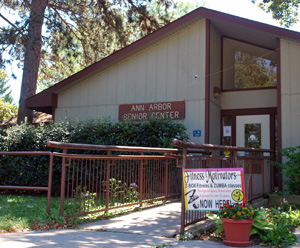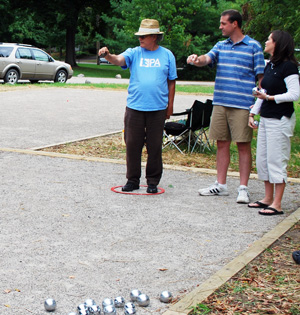Shoring Up the Ann Arbor Senior Center
When The Chronicle attended last week’s meeting of the Ann Arbor Medical Marijuana Patient Collective – held at the Ann Arbor Senior Center – we were reminded that the last time we’d been to the center was in the context of its potential closing, because of city budget cuts.

A sign at the Ann Arbor Senior Center advertises a new fitness program, one of several efforts by the city to raise revenues for the center, which is located in Burns Park. (Photos by the writer)
Last year, the city administration identified the senior center as one facility that, if closed, could save the city roughly $150,000 – the center’s operating deficit at the time. Residents mobilized, and a task force was formed that developed recommendations for cutting costs and raising revenues.
Recommendations include hiring a consultant to develop a long-term strategic plan, paid for by a $16,949 grant from the Ann Arbor Area Community Foundation. A request for proposals (RFP) was issued earlier this summer for that project, and responses from three companies are now being evaluated, according to Jeff Straw, parks & recreation deputy manager.
Meanwhile, several other efforts are underway, including this coming Saturday’s “Picnic in the Park” fundraiser, which runs from 1-3:30 p.m. at Burns Park, where the center is located. Last year, the event raised about $1,000 for the center.
Raising Revenues: Membership Fees, New Programs
Several of the recommendations developed by the senior center task force have already been implemented. The efforts were led by staff of the city’s parks & recreation unit, which has oversight of the center. [For background on the development of these recommendations, see Chronicle coverage: "Task Force Tries to Save Senior Center," "Twittering at the Ann Arbor Senior Center," and "Park Commission OKs Fee Increases, Budget"]
A membership fee of $25 for individuals and $35 for households was put in place this summer. So far, 220 people have signed up, raising $4,500. The goal for membership revenue is $12,500, Straw said. “It’s promising,” he said. “We’re making good progress there.”
Next week, a new schedule of fall programming will be released, Straw said, available both the senior center’s website and in a printed brochure – about 10,000 copies will be distributed at locations throughout the city. A lecture series, new classes and other activities are being offered, including a new Monday night American Contract Bridge League (ACBL) session.
The city has also contracted with two fitness companies – Fitness Motivators and Fitness RX – to offer classes for both seniors and the general public. They’ll have a range of offerings, Straw said, including yoga, Pilates and weight training.

Jeff Straw, center, gets instruction on the game of pétanque at last year's "Picnic in the Park," a fundraiser at Burns Park to raise money for the Ann Arbor Senior Center. This year's "Picnic in the Park" is on Saturday, Aug. 21. Straw is deputy manager of Ann Arbor's parks & recreation unit, which has responsibility for the center.
The contracts with these fitness companies include a revenue split from class fees, with 40% going to the city. Straw said that agreements with instructors who teach other types of courses at the center are being revised to achieve that 60/40 revenue split, too. Previously, instructors kept a larger share of revenues from class fees, as much as 80%.
The city is also issuing an RFP for operating a travel program at the center, Straw said. The city staff will hold an informational meeting this Friday, Aug. 20, for people interested in making a proposal. Final submissions are due Sept. 3. The task force had estimated that a travel program could raise $3,390 in net revenue annually, possibly more. [The couple who handled the center’s excursions for the center for 20 years, Dean and Carolyn Cole, retired from that role last year. Carolyn Cole passed away in late 2009.]
In addition to revenue-generating efforts, the center has cut expenses too, Straw said. It’s now closed on Fridays, and its lunch program is handled by volunteers, rather than a staff person.
The center will also draw about $37,000 this year from the bequest of James Flinn Jr., who gave $100,000 to the center in 2007. With accrued interest, that amount has increased to about $112,000. The task force recommendations called for using a third of the bequest this year, to offset operating costs. The remaining two-thirds will be used in the next two years.
Despite these changes, the senior center is still expected to operate at a loss of about $55,000 during the current fiscal year, which began July 1.
Longer-Term Plans
Three firms responded to the city’s RFP for a consultant to develop a strategic plan for the senior center. They are Schumaker & Co. of Ann Arbor, Hooker De Jong and The Woods Consulting Group of Muskegon, and The Kittle Group of Auburn Hills. The scope of work is described in this excerpt from the RFP:
The consultant will be responsible for researching and developing a comprehensive strategic business/operating plan, including the following elements:
1. Background Information: Collect and review current and historical information/materials about the organization that will be helpful to the planning process.
2. Operating Budget Analysis: Analyze options to create stable funding and develop budget forecasts to sustain long-term Center operations including:
• Cost Reductions: Evaluate both short term and long term cost reduction strategies.
• Fee-Based Programming: Assess the cost effectiveness of offering an expanded array of fee-based/revenue generating programs and services, which appeal to a broader range of residents (i.e., “boomers”, intergenerational programs, youth services, etc.), with extended evening/weekend hours.
• Facility Rental/Product Sales: Conduct competitive research with banquet/meeting event rental facilities in the area to estimate the potential revenue that could be generated if the facility is enhanced to make it appealing for rental by private parties. Determine the cost of facility enhancements (i.e., renovations to the space; purchase of furniture, equipment, supplies, etc.) required to generate the maximum amount of rental income possible.
• Other Revenue Generating Options: Explore opportunities to generate revenue through increasing members, grants, fund raising, donations, etc.
* Operating Expense Forecasts: Determine the impact of programming changes on staffing levels/operating expenses and develop budget forecasts.
3. Market Research:
• Senior Centers: Analyze market research and regional/national best practices to evaluate strategies to improve operational efficiency and effectiveness.
• Quantitative Research: Survey a cross-section of Ann Arbor City residents to determine the desires, interests, and needs of community residents which could be met by expanding fee-based/revenue generating programs and services at the Center, targeted to all ages.
• Qualitative Research: Conduct focus groups with interested residents and program participants to assess opportunities for program development and enhancement.
4. Collaborative Partnerships: Convene meetings with the Executive Directors of other neighboring senior centers to evaluate strategies for collaboration to improve services for underserved programs/ services, evaluate impact of duplication of service delivery, enhance programs, increase revenue, and reduce costs.
5. Community Engagement/Communication Plan: Create a communication plan and marketing strategy to actively engage the community in supporting center operations/activities; and recommend enhancements to the website that creates enhanced awareness of programs and services being offered.
6. Planning Retreats: Conduct planning retreats with City leadership team (i.e., Council & PAC members, staff, and individuals representing residents and participants) to analyze all of the data/information collected and develop the short and long-range components of the strategic business/operating plan.
The deadline for responding was July 16, but Straw said that city staff had questions for the companies that responded, and gave them until the end of August to submit revised proposals. They hope to have the strategic plan completed by February 2011, ready to make recommendations to city council in the March/April time frame.
Coda: What About Mack Pool?
Mack Pool, which is shared by the city of Ann Arbor and Ann Arbor Public Schools and located in the Ann Arbor Open school, was also considered for closing during the last budget cycle. Similar to the senior center, a task force was formed to come up with a strategy for closing the gap between expenses and revenues. [For Chronicle coverage, see: "Task Force Floats Ways to Save Mack Pool" and "More Options for Ann Arbor's Mack Pool"]
Straw said that not as many of the task force recommendations for Mack Pool have been implemented yet, but some things are in progress. The city is ordering a thermal pool blanket, which is expected to save energy costs in two ways: 1) by containing the heat in the water and cutting the city’s natural gas expenses, which are about $37,500 a year for Mack Pool, and 2) by limiting water evaporation and saving on the school’s water bill. [In the current agreement between the city and schools, the city pays for natural gas and the schools pay for water.]
A new swim schedule is being finalized, Straw said, and will include additional time for lunch swims as well as additional time on Tuesday and Thursday mornings for swim lessons and other programs.
The city is also planning to install new LED lights in the pool – that’s estimated to save about $2,000 annually. The lights have been ordered, Straw said, and will likely be installed in the few weeks.
The pool is closed for the summer, and will reopen on Sept. 7.




Out of curiosity, how much are the LED lights?
Re. cost of LED lights: This info came from Andrew Brix, the city’s energy programs manager:
The fixtures are $818.59 each for a total of $11,460.26. A grant covers 90% of the equipment cost, so the city’s share is $1,146 for an expected annual savings (labor, equipment, and energy) of $958 and a 1.2 year simple payback.
Amazing that Ann Arbor–which was voted one of the top cities in the country to retire–even considers closing the Senior Center.
~Stew